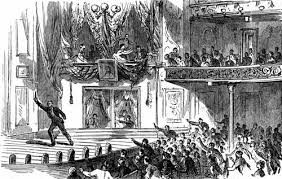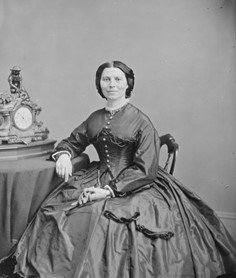Winner of the Fall 2016 StMU History Media Award for
Best Article in the Category of “United States History”
Post Civil War America showed the country as it never was before. Union and Confederate States, though reunited, still held grief directed toward one another. Most citizens just learned to adapt to the situation, but others choose to act out. An assassin will act as a vigilante by murdering a political figure in order to attempt to change the course of history. The first example of this in America was the assassination of President Abraham Lincoln and the attempted assassinations of Lincoln’s Cabinet by a group of vigilantes led by America’s first Presidential Assassin: John Wilkes Booth.1
John Wilkes Booth was born in May of 1836 into a family of actors, and was taught by his father Junius Brutus Booth. The Booth family traveled the country and performed for crowds. Booth was a handsome young man and a glorious actor. He often played the romantic hero’s of Shakespeare’s finest tragedies. Most notably he astounded audiences with his portrayal of Romeo in Shakespeare’s Romeo and Juliet. His good looks and charisma got him through most situations and made him irresistible to young women.2
As the Civil War began, tensions began to rise in the Booth family. John Wilkes Booth was alone in his hatred of the North, and often argued against his Union-loving family. He believed the cause of the Confederates was noble and that southern states’ rights were being ignored. Booth argued that Lincoln was a tyrant that wished to take everything away from the South.3 In 1859, Booth joined the Richmond, Virginia militia, and was assigned to be among one of the men who hung John Brown. Brown was the famous northern abolitionist who planned a slave insurrection and killed five slaveholding men.4 Although he carried deep pride for the Southern cause, Booth never joined the Confederate forces, but instead continued his acting career well into the Civil War.

In 1864, as the war continued, Booth materialized a plan to kidnap President Abraham Lincoln and hold him for ransom for the release of all Confederate prisoners of war.5 To pull this off Booth had to recruit a gang of fellow Confederate sympathizers, and after several meetings, Booth found his perfect team. The first to join his team was John Surratt, a Confederate agent and son of Mary Surratt who owned the Surratt Boarding House.6 The second was David Herold a Confederate sympathizer; the third was George Atzerodt, who was a German immigrant; the last was Lewis Powell, a prisoner of war from the Battle of Gettysburg.7
On March 17, after six months of plotting the kidnapping, Booth received word that Lincoln would be in their area attending a play at a local hospital.8 The men gathered their gear and laid in wait for their target to arrive. Booth set up a perimeter around a long stretch of road in an attempt to kidnap Lincoln en route to the hospital. After hours of waiting, Booth received new information that Lincoln had changed his plans to attend another event on the same day.9 Infuriated, Booth called his men back to the Surratt Boarding House and threw away any hopes of kidnapping Lincoln.
As the war came to an end and the Union victory loomed as inevitable, Booth and his conspirators became enraged and decided to escalate their plans.10 The group planned to destroy the United States government by assassinating President Lincoln, Vice President Andrew Johnson, and Secretary of State William H. Seward simultaneously. Each of the assassins was given a specific job; Powell would attack Seward in his hotel room, Atzerodt would assassinate Johnson, Herold would supply horses for the men’s escape, and Booth would take on Lincoln himself.11
The plan was set, and now the group only needed an opening. On April 14th, 1865, Booth received word from the manager of Ford’s Theatre, a place where Booth had acted previously, that President Lincoln would be attending that night’s show of Our American Cousin.12 Upon receiving the news, Booth began preparing his men for the night to come. Night fell, and the men headed out, each in the direction of their designated target.

Powell was guided to Seward’s house and when he arrived, he knocked at the door. The door was opened, and Powell pushed his way into the room where Seward laid, and stabbed him in the head multiple times. Powell saw Seward begin to bleed and he fled from the scene immediately. Fortunately for Seward he was wearing head-gear due to a carriage accident he had previously been involved in, and his life was spared. At the same time, Atzerodt headed towards the hotel where Andrew Johnson was staying. Atzerodt first headed to the hotel’s bar to settle his nerves, had a little too much to drink, ended up intoxicated, walked out of the hotel and gave up on the assassination.13 Lastly, Booth began his plot and entered Ford’s Theater armed with his single shot .44 derringer pistol and a large knife.14 Booth then snuck his way into the President’s box and found Lincoln, his wife, Mary Todd, accompanied by Major Henry Rathbone and Rathbone’s fiancee. Before anyone saw him, Booth slid his pistol out of his pocket and shot Lincoln in the back of the head. Major Rathbone jumped toward Booth, but Booth took out his knife and slashed at Rathbone.15

Once he was freed from Rathbone’s grip, Booth jumped from the President’s box, but as he fell, his leg got caught on a drape and as he landed he broke his leg. Pushing himself up, Booth screamed, “Sic Semper Tyrannis!” which means “Thus Always to Tyrants” and pushed his way to the alley where Booth’s horse was waiting, and he rode off into the night.16
- Salem Press Biographical Encyclopedia, January 2006, s.v. “John Wilkes Booth,” by R. Baird Shuman. ↵
- Salem Press Biographical Encyclopedia, January 2006, s.v. “John Wilkes Booth,” by R. Baird Shuman. ↵
- Salem Press Biographical Encyclopedia, January 2006, s.v. “John Wilkes Booth,” by R. Baird Shuman. ↵
- Arthur F. Loux, John Wilkes Booth : Day-by-Day (Jefferson, N.C.: McFarland & Company, Inc., Publishers, 2014), 35. ↵
- Salem Press Biographical Encyclopedia, January 2006, s.v. “John Wilkes Booth,” by R. Baird Shuman. ↵
- Loux, John Wilkes Booth: Day-by-Day, 166. ↵
- Elizabeth Leonard, Lincoln’s Avengers: Justice, Revenge, and Reunion after the Civil War (W. W. Norton & Company, 2005), 41. ↵
- Loux, John Wilkes Booth : Day-by-Day, 190. ↵
- Loux, John Wilkes Booth : Day-by-Day, 190. ↵
- Loux, John Wilkes Booth : Day-by-Day, 192. ↵
- Kathy Wilmore, “Wanted! The President’s Killer,” Junior Scholastic 117, no. 12 (April 20, 2015): 12. ↵
- Loux, John Wilkes Booth : Day-by-Day, 194. ↵
- Wilmore, “Wanted! The President’s Killer,” Junior Scholastic 117, no. 12 (April 20, 2015): 13. ↵
- Wilmore, “Wanted! The President’s Killer,” Junior Scholastic 117, no. 12 (April 20, 2015): 12. ↵
- Loux, John Wilkes Booth : Day-by-Day, 198. ↵
- Loux, John Wilkes Booth : Day-by-Day, 198. ↵



36 comments
Barbara Ortiz
Congratulations on your award. I always found this plot to be an interesting study. While at Georgetown, one of our theater groups likes to brag that Booth was a member of their ensemble despite never attending the university. I also think Lincoln’s assassination is an interesting case because although he created the Secret Service, the purpose was to detect counterfeit currency. It wasn’t until the assassination of McKinley that the Secret Service would be the dedicated detail to the Presidents.
Christopher Metta Bexar
Very interesting…
I have heard a lot about the assassination of Abraham Lincoln , but mostly about the night it happened and how Mary Surratt took the fall for it ( likely becoming the first woman executed for a federal crime).
One always tends to assume that John Wilkes Booth had been a soldier and his brother Edwin , the famous actor. Some stories tell that Edwin was appearing in My American Cousin and that is why the President came.
Eliana Villarreal
I really enjoyed the story line of your article! It was simple and an easy read into why and how Lincoln’s assassination occurred. It was crazy to read that it was a whole ongoing plot that Booth wanted to kidnap Lincoln at first, and then evolved to an assassination of him, his vice president, and the secretary of state. Anger does tend to make people act out in extreme ways, but wow this is a whole other ball park. I appreciate the suspense added at the end with the second part continuation. Congratulations on your award and job well done!
Tomas Salazar
I was amazed to see how many people that were involved with the conspirators of the assassination of President Lincoln. I was impressed by the descriptions and story you told about the assassination of President Lincoln. This article had me reading from the beginning to the very end. Booth recognized himself as some sort of hero, yet he is known for being a murderer and coward.
shylynn warner
it was interesting, i never knew all this! it was nice to read more about the assassination of abam lincoln?
Phylisha Liscano
Hello Roberto, congratulations on the award. This article was very interesting to read and the images were great to look at. The story was so entertaining and crazy to read. I never took time out of my day to completely learn about the assassination of President Lincoln and your article did wonders. Their plan strategy was so crazy. I liked how you made this into two parts leaving us wanting more. Great article!
JoAnna Mendez
I loved how much detail this article had. It is crazy to see how much a person will do to get rid of those they do not like. This assassination changed our history so, it is interesting to see the process it took the killers to plan this out. I will say, it is a little shocking to hear that Booth was able to service the fall from the presidential box and that he was able to get on his horse despite his broken leg.
Abilene Solano
This was a very interesting article because I knew the famous story of the assassination of President Lincoln, however, I did not know that it originally wasn’t suppose to be an assassination but a kidnapping. I was very surprised by this fact, ironically enough though John Wilkes Booth set himself up for failure. Not only did his plans failed the first time with him attempting to kidnap the president but also the assassination- yes he did succeed in his goal of killing Lincoln but that very event didn’t “destroy the United States government” liked he planned. Also, I really liked how the author went about writing this article, taking in a perspective that not many people would read about. I really liked how the author wrote this article that it made me interested to read the second half of this story.
Reagan Clark
This article was fascinating. It gave a lot more detail than anything that I’ve read in school. I did not know that this was a three part assassination attempt or that they tried to kidnap him first. Middle school history teachers really should not leave out this kind of information. This article was well research and put together nicely. I like how the article did not focus only on booth but all three of the assassins. Well done!
Andrea Degollado
Extremely well written article! I always found it interesting to read about President Lincoln and his assassination and everything behind it, so I personally loved this article. This was a truly informative article. I really enjoyed the details and imagery I think this article really took on a great perspective and just was truly great. Great article! One of my favorite!
Diego Terrazas
This was such a major tragedy in American history. I believe Lincoln could have done much more with his presidency that could have even benefited America in the long run. I enjoyed the imagery that was incorporated in this article. Providing a story through Booth’s point of view is quite unique and captivating. I wonder how serious they took security back then or if bodyguards even existed.